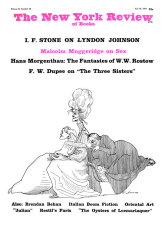In response to:
Traveling Light from the June 25, 1964 issue
To the Editors:
Stanley Kauffmann’s complaints about Robert Frost in Russia, by F. D. Reeve, seem mostly the expression of a personal distaste for the book, and can’t be debated factually. Reeve is “an unfelicitous writer,” says Mr. Kauffmann, who sets his sights for felicity no higher than to speak of Frost as “our half of a two-poet exchange deal.” He accuses Reeve of banality of mind.
One alleged fact I think should be disputed, and will be by anyone who reads Reeve’s book. It is in these two sentences of Mr. Kauffmann’s: “By this time Frost was a kind of portable Roman ruin, his mind not untouched by senility.” And “It needs small imagination and no derogation of Frost to see how little the comments of the ancient, sick, politically inexperienced poet meant to the Premier.” Here Mr. Kauffmann has made fact of his own opinion The extraordinary vigor of that old man—as alert and creative in his last year as Casals is today—is attested to by Reeve’s account and by anyone who had to do with Frost in his last months. The only accurate word in the two sentences I have quoted is ancient, and even that is contrary to the impression Frost generally gave.
William Meredith
Connecticut College
New London, Connecticut
Stanley Kauffmann replies:
“Our half of a two-poet exchange deal” is exactly what Frost was in this case. I suggest that the infelicity is in the idea, not my description of it.
I alleged no facts. One of the sentences Mr. Meredith quotes contains the word “imagination,” and the word “impression” occurs several times in the review. I never met or saw Frost, but I am far from alone in the relatively mild opinion that his last years were “not untouched by senility,” particularly in discourse. After all, the man was in his late eighties; is it offensive to suggest that he was mortal? Mr. Meredith is incorrect in his last statement. The word “sick” is literally accurate; that is why Khrushchev visited Frost’s bedroom. As for the poet’s political acumen, this sample, followed by Khrushchev’s poker-faced comment, tells more, I think, than Reeve (as usual) perceives:
Frost said that the Premier had great power and could do great good by effecting a political settlement through dealing unilaterally with the United States; that all Khrushchev has to do was to make a simple solution to the Berlin crisis and that the United States would accept it. “You have the soul of a poet,” Premier Khrushchev replied.
This Issue
July 30, 1964



